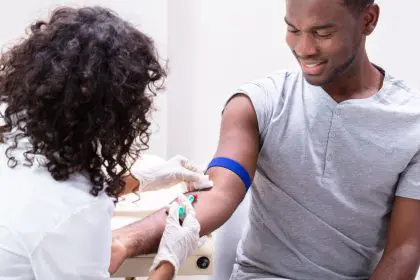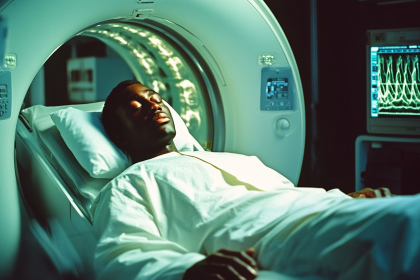A groundbreaking discovery from the Sylvester Comprehensive Cancer Center at the University of Miami has revealed an unexpected link between our body’s true age and colorectal cancer risk. The research shows that your biological age – not just the number of candles on your birthday cake – might be the key to understanding your cancer risk. This discovery comes at a crucial time when medical professionals are seeing an alarming rise in colorectal cancer cases among younger adults.
What your body’s clock is trying to tell you
The human body ages differently from person to person, influenced by everything from genetics to lifestyle choices. Think of biological age as your body’s true age rather than the number on your driver’s license. This cutting-edge research suggests that when your biological age runs ahead of your actual years, it could be sending an important warning signal about your health.
Scientists used advanced DNA analysis techniques to measure biological age, looking at specific markers that indicate how well the body is functioning. These markers can be influenced by various factors, including diet, exercise habits, stress levels, and environmental exposures. Understanding these influences helps explain why some people may be more vulnerable to certain health conditions despite their chronological age.
The numbers that could save your life
The research presents several alarming statistics that everyone should know:
- For each year your biological age exceeds your chronological age, your risk of developing colon polyps jumps by 16%
- Colorectal cancer rates in people under 50 have been climbing by 2% every year since 2011
- Between 20% and 30% of adults have polyps that could potentially develop into cancer
- Nearly half of early-onset colorectal cancer cases occur in people younger than 45
- Men face a higher risk of developing precancerous polyps compared to women
These statistics have prompted medical professionals to reevaluate traditional screening guidelines and consider more personalized approaches to cancer prevention.
A new approach to screening
Dr. Shria Kumar, who led the research, emphasizes that these findings could revolutionize how doctors approach cancer screening. Instead of waiting until you hit a certain age, healthcare providers might soon look at your biological age to determine when you should start getting checked.
This shift in thinking represents a major advancement in preventive medicine, moving away from one-size-fits-all guidelines toward more personalized recommendations. The approach could be particularly beneficial for younger adults who might otherwise slip through the cracks of traditional screening protocols.
Understanding polyps and prevention
Colon polyps, while common, represent a crucial warning sign that shouldn’t be ignored. These small growths on the lining of the colon or rectum can develop into cancer if left untreated. The study’s findings suggest that individuals with accelerated biological aging might be more prone to developing these precursors to cancer, making early detection even more critical.
The gold standard in prevention
While modern medicine offers various screening options, colonoscopy remains the most effective tool in preventing colorectal cancer. Unlike at-home tests, this procedure can both detect and remove potential threats in a single visit, making it a powerful weapon in the fight against cancer.
During a colonoscopy, doctors can visualize the entire colon and remove any suspicious polyps before they have a chance to develop into cancer. This dual capability of detection and prevention makes colonoscopy uniquely valuable in cancer prevention efforts.
Breaking down the risk factors
Traditional risk factors like smoking and obesity didn’t tell the whole story in this study. Instead, biological age emerged as a crucial predictor of cancer risk, challenging conventional wisdom about who might be at risk for developing colorectal cancer.
This finding suggests that even individuals who maintain healthy lifestyles might need to pay attention to their biological age as an independent risk factor. The research team found that environmental factors, stress levels, and genetic predisposition all play roles in determining biological age.
The role of lifestyle choices
While biological age appears to be a significant factor in cancer risk, experts emphasize that lifestyle choices still matter. Regular exercise, a balanced diet rich in fiber, limited alcohol consumption, and avoiding tobacco use can all help maintain a healthy biological age and reduce cancer risk.
Implications for different age groups
The study’s findings have different implications for various age groups:
- Young adults under 45 might need earlier screening if their biological age is accelerated
- Middle-aged individuals between 45-50 could benefit from more frequent screenings based on their biological age
- Those over 50 might need to adjust their screening intervals according to their biological age status
Looking to the future
The medical community continues to investigate this connection between biological age and cancer risk. Dr. Anton Bilchik, a prominent surgical oncologist, points out that understanding these relationships becomes increasingly important as more young adults face colorectal cancer diagnoses.
Researchers are now exploring ways to make biological age testing more accessible and standardized, which could help healthcare providers make more informed decisions about cancer screening recommendations.
What this means for you
This research suggests a future where cancer screening becomes more personalized, taking into account your body’s true age rather than just your birth date. It opens new possibilities for early detection and prevention, potentially saving countless lives through timely intervention.
The findings serve as a reminder that staying informed about your health and discussing screening options with your healthcare provider could make a crucial difference in catching potential issues early. As research continues to evolve, understanding your biological age might become as important as knowing your chronological age when it comes to protecting your health.
For now, experts recommend maintaining open communication with healthcare providers about personal risk factors and family history while staying current with recommended screening guidelines. The future of cancer prevention may lie in this more nuanced understanding of how our bodies age and what that means for our health risks.















